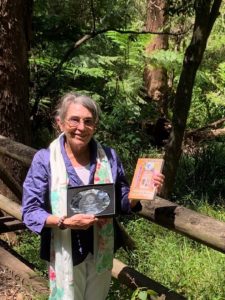
Hildegard of Bingen: A poetic journey has won two awards at the Society of Women Writers NSW Biennial Book Awards at The State Library NSW on Wednesday 10th February 2020.
SWW Poetry Book Award 2020
SWW Non-fiction Book Award 2020
In the acceptance speech Colleen Keating said:
This is for Hildegard. This is for women. This is for those who have been silent, lost, or suppressed down the ages of 2000 years and more, of women who are being rediscovered to bring a balance back into the voice of history.
This is for our environment and our earth. Hildegard called earth our Mother and reminds us to care for her as we would our mother. Our air, our rivers our soil, our forests must be nurtured for they nourish us as a mother does.
This is for our well being. Hildegard reminds us that nature and music are natural spirit given healers. Hildegard has returned 900 years aftern her death and it is no accident she is speaking to people in this 21st century at this time all over the world. We need her wisdom more than ever.
Thank to all for this awards. Thanks to the shortlisted poets and especially Pip as runner-up. Jan Conway, President of the SWW and the committee.

Special thanks to Stephen Matthews AOM and Ginninderra Press for affirming my work and beliveing in Hildegard and publishing my verse novel.it

My friend and supporter, acclaimed poet, Pip Griffin renowned for her verse novel – the journey of a Chinese Buddhist nun ani lin, was runner-up and highly commended for the SWW Poetry Book Award for her evocative poetic journey:
Margaret Caro
the extraordinary life of a pioneering dentist
New Zealand 1848-1938
as the judge, highly acclaimed poet Margaret Bradstock wrote,
“Both Hildegard of Bingen and Margaret Caro are sustained narrative collections of poems celebrating the lives of strong, single-minded and deeply religious heroines, one an anchorite, visionary and ultimately abbess during the Middle Ages, the other a New Zealand dentist at the turn of the nineteenth century.
Through judicious poetic description the writers Colleen Keating and Pip Griffith respectively, are able to enliven their stories and engage the interest of the reader. Over several hundred pages of verse, this is no mean feat. Griffin records her protagonist’s account in first-person stanzas, as a kind of poetic ventriloquy, allowing us entry to her thoughts and feelings, italicised conversation and quotations counterpointing this perspective. By contrast, Keating as poet tells Hildegard’s story, but interpolates the anchorites’s spoken words and unspoken musings in italics.”
Congratulations Pip .

